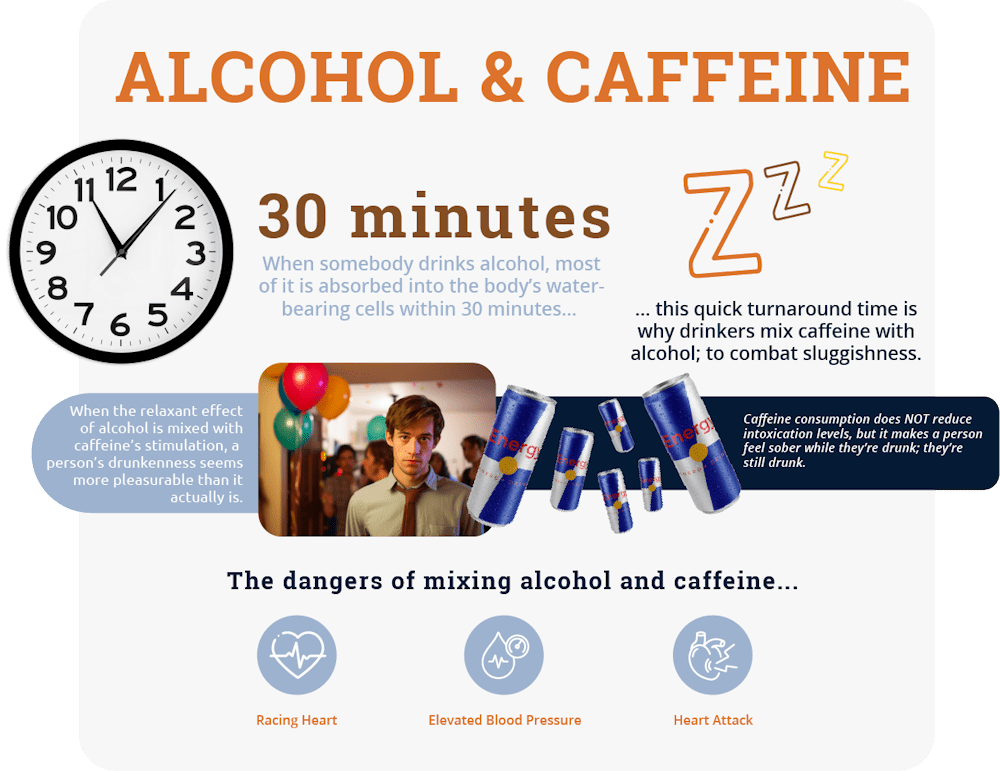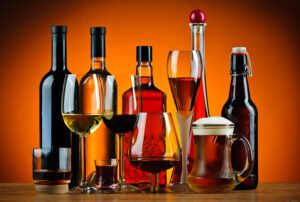Alcohol abuse is dangerous enough on its own without adding caffeine to the mix. Mixing caffeine with alcohol can be dangerous, and it’s one of the most popular things to do in today’s culture.
Many individuals in the party scene have had their fair share of vodka red-bulls while those in more classy social settings choose to drink espresso martinis. Regardless, there are a great many reasons as to why this is so dangerous. Dependency on alcohol or caffeine can lead to short-term and long-term risks and dangers. At our Illinois alcohol rehab center, we can help you determine if you are dependent on alcohol. And if necessary, we can help get you back on your feet.
Jump to Section
Why Do People Mix Alcohol and Caffeine?

People often mix alcohol and caffeine in pursuit of a specific combination of effects. Alcohol is a depressant, which means it can make a person feel relaxed or sleepy. On the other hand, caffeine is a stimulant, known to increase alertness and reduce feelings of tiredness.
The combination of these two substances can create the illusion of feeling less intoxicated than one actually is. This can lead to higher alcohol consumption, as the person might underestimate their level of impairment. However, it’s important to note that mixing these two substances can pose serious health risks and should be done with caution, if at all.
The Dangers of Mixing Alcohol and Caffeine


This can result in excessive alcohol consumption and increase the chances of alcohol-related injury. Additionally, both alcohol and caffeine can dehydrate the body, exacerbating hangover symptoms and potentially leading to serious health complications. Feel free to take our alcohol assessment if you think you may be dependent on alcohol.
Consuming caffeine and alcohol together can potentially lead to negative health implications. While alcohol is a depressant that slows down the brain’s functions, caffeine is a stimulant that accelerates them. The opposing effects of these two substances can mask the degree of impairment caused by alcohol, leading individuals to consume more than they normally would.
This can result in severe dehydration, sleep disturbances, cardiovascular issues, and in extreme cases, alcohol poisoning. It’s crucial to consume both these substances in moderation and be aware of their potential interactions.
Consuming alcohol and caffeine comes with several potential risk factors. Regular alcohol consumption can lead to serious health problems including liver disease, heart disease, and an increased risk of strokes. It can also result in behavioral changes and addiction.
On the other hand, excessive caffeine intake may lead to heart palpitations, insomnia, digestive problems, and dependence. When consumed together, alcohol and caffeine can mask the effects of each other, potentially leading individuals to consume more than their bodies can handle, resulting in even more severe health complications.
Consuming alcohol and caffeine together presents several behavioral risk factors. For instance, caffeine can mask the depressant effects of alcohol, leading individuals to underestimate their level of intoxication. This false sense of sobriety can increase the risk of engaging in dangerous activities such as drunk driving. Additionally, the combined consumption of alcohol and caffeine can lead to increased alcohol intake as the alertness induced by caffeine may prolong the duration of drinking sessions. This pattern could potentially contribute to the development of alcohol dependence over time.
What Happens to Alcohol and Caffeine When they are Mixed Together?
When alcohol and caffeine are mixed, the effects can be rather concerning. Caffeine, a stimulant, masks the depressant effects of alcohol, which can lead individuals to believe they are less impaired than they are.
This misconception can lead to risky behaviors, such as drunk driving. Moreover, both alcohol and caffeine are diuretics, increasing the rate of urine production and potentially leading to dehydration if not carefully monitored. Despite the temporarily heightened alertness and energy from caffeine, it does not sober up a person who has consumed alcohol.
How Often Do People Mix Alcohol and Caffeine?


The combination of alcohol and caffeine is fairly common, particularly among teens. Many of our clients in our young adult rehab report using alcohol and caffeine simultaneously often. This trend is largely driven by the popularity of energy drinks and the misconception that caffeine can counteract the effects of alcohol. However, it’s important to note that combining these two substances can lead to significant health risks, including impaired judgment and increased potential for addiction.
When alcohol and caffeine are consumed together, the stimulating effects of caffeine can mask the depressant effects of alcohol. This can lead to a false perception of sobriety, causing individuals to underestimate their level of impairment. Caffeine doesn’t decrease blood alcohol concentration, leaving motor skills and decision-making abilities just as impaired as without the caffeine. As a result, people might engage in risky behaviors such as drunk driving or taking other substances, believing they’re more alert and capable than they actually are.
What Substances Do People Mix with an Alcohol and Caffeine Cocktail?
People often mix caffeinated drinks with alcohol to create a variety of cocktails. Some of the most popular combinations include Irish Coffee, which blends coffee with whiskey and cream, and the Espresso Martini, which mixes vodka, coffee liqueur and a shot of espresso. Energy drinks, high in caffeine, are also commonly mixed with alcohol, particularly with vodka or tequila.
Vodka Red Bull is another popular combination of alcohol and caffeine. This cocktail is quite simple, yet potent, usually comprising equal parts vodka and Red Bull energy drink. The caffeine in the energy drink counteracts the depressant nature of alcohol, keeping the drinker alert and active despite consuming alcohol. However, this cocktail has been subject to controversy and scrutiny due to the potential health risks of mixing alcohol with energy drinks.
Short-Term Effects of Alcohol and Caffeine Mixed Together
Mixing alcohol and caffeine can have immediate and potentially harmful effects. Caffeine, a stimulant, masks the depressant effects of alcohol, making individuals feel more alert and less drunk than they actually are. This can lead to increased alcohol consumption and a higher risk of alcohol-related injuries. Other short-term effects include dehydration, increased heart rate, and disturbed sleep patterns. Additionally, both alcohol and caffeine can irritate the stomach and lead to discomfort or digestive issues.
Alcohol and caffeine can irritate the stomach in several ways. Alcohol irritates the stomach lining, increasing the production of stomach acid which can lead to gastritis or stomach ulcers. It also slows down the rate at which the stomach empties, causing feelings of bloating and discomfort. On the other hand, caffeine stimulates the secretion of gastric acid, which can lead to inflammation of the stomach lining, indigestion, or even ulcer formation if consumed excessively. It’s important to understand these potential impacts to make informed choices about our consumption of alcohol and caffeine.
What Does the CDC Say About Alcohol and Caffeine Beverages?
According to the Centers for Disease Control and Prevention (CDC), the combination of alcohol and caffeinated beverages can lead to dangerous health risks. Mixing the two may mask the depressant effects of alcohol. This leads to consuming more alcohol than they normally would, and potentially leading to alcohol poisoning.
Recent studies indicate alarming trends related to the consumption of alcohol mixed with caffeine. Those aged 15-23 who mix alcohol with energy drinks are four times as likely to binge drink than those who don’t. 30% of those from the ages of 19-28 have consumed an alcoholic beverage mixed with caffeine at least once in the past year.
Out of 1,000 college students, approximately 24% report consuming alcohol mixed with energy drinks in the past 30 days. Additionally, the Substance Abuse and Mental Health Services Administration (SAMHSA) reports that emergency department visits related to the consumption of alcohol mixed with energy drinks doubled from 10,000 to 20,000 visits annually.
Can People Become Dependent on Alcohol and Caffeine?


Yes, people can develop a dependence on substances such as alcohol and caffeine. Chronic consumption of alcohol can lead to alcohol dependence; this is a serious condition characterized by strong cravings for alcohol, loss of control, and withdrawal symptoms when not drinking. Similarly, habitual intake of caffeine can result in caffeine dependence, marked by a persistent desire or unsuccessful effort to cut down or control caffeine use. Withdrawal symptoms like headache, fatigue, and irritability following cessation or reduction of caffeine use can also happen.
When a person becomes dependent on substances like alcohol and caffeine, a series of physiological and psychological changes can occur. Alcohol dependency can lead to serious health issues, including liver damage, heart disease, and an increased risk of cancers. It can also lead to psychological disorders like depression and anxiety. Similarly, caffeine dependence can result in physical symptoms such as insomnia, heart palpitations, and digestive issues.
If you find yourself dependent on alcohol and caffeine, it’s crucial to first acknowledge the issue. Acceptance is the stepping stone to recovery. Then, seek professional help. Health professionals like doctors and psychologists can offer strategies and treatments to manage your dependency. It’s also beneficial to engage in supportive communities, such as 12-step therapy programs or other similar groups.
Northern Illinois is Here for You
Alcohol abuse, especially alcohol mixed with caffeine, is a dangerous game. Thankfully, Northern Illinois Recovery is here to help. If you or a loved one would like to take the next step, you can contact us here.


Licensed Physician and Surgeon
Dr. Beth Dunlap, a board-certified addiction medicine and family medicine physician, and is the medical director at Northern Illinois Recovery Center. She is responsible for overseeing all the integrated medical services at both campuses. Beth completed medical school, residency, and fellowship at Northwestern University, where she continues to serve on the faculty as a member of the Department of Family and Community Medicine. She has extensive experience in addiction medicine at all levels of care, and her clinical interests include integrated primary care and addiction medicine, harm reduction, and medication-assisted treatment.



